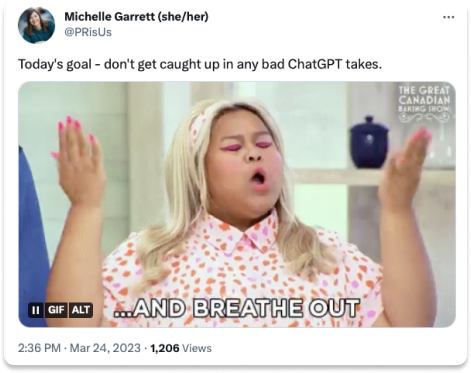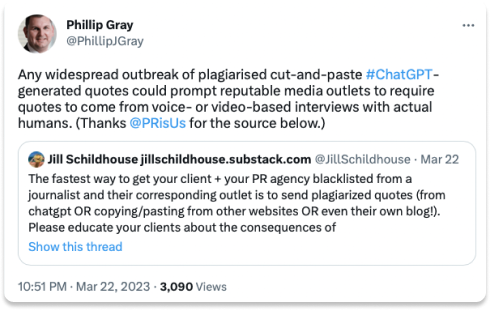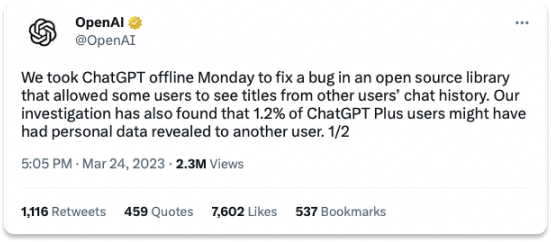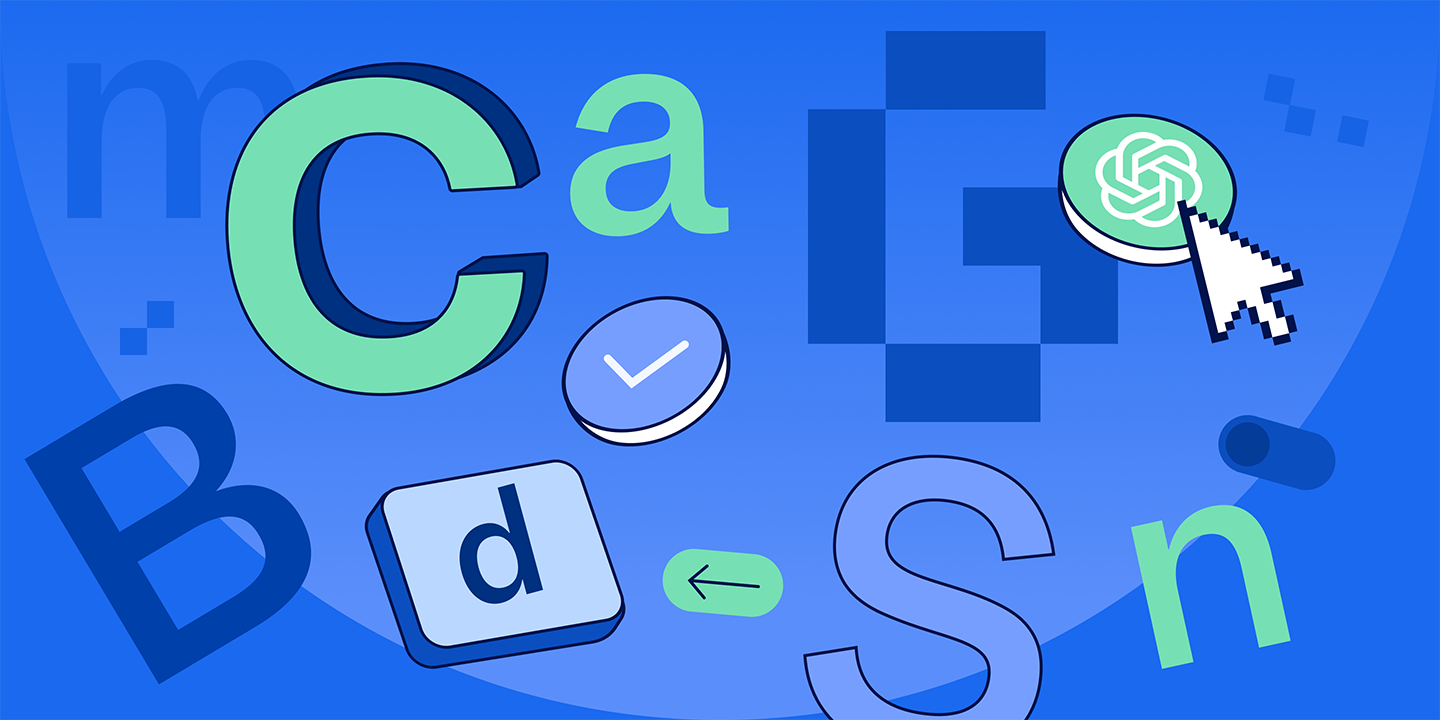It’s the biggest question being discussed in the PR industry right now: what are the implications of ChatGPT for PR?
Some in the industry are noticeably worried. They wonder if this new PR technology will make PR roles obsolete by perfecting the expert skills of PR professionals.
But we disagree and are leaning towards a more optimistic viewpoint. We see many benefits in using ChatGPT for PR tasks that need less of a human touch, in turn freeing up more time for fine-tuning communications and building bigger PR strategies.
Missed out on PR Episodes 2024? Catch up on demand to discover how AI is transforming PR. Learn from the experts how to leverage these tools to amplify your efforts.
We’ve done some research and will share how we arrived at this stance. In this article we will present:
- What is ChatGPT?
- The uses of ChatGPT for PR managers
- What’s new in GPT-4?
- The limitations of ChatGPT for PR
- What PR pros and journalists say about ChatGPT and GPT-4
- Our current outlook on ChatGPT for PR
What is ChatGPT?
ChatGPT is a free OpenAI chatbot launched in November of 2022.
The news of ChatGPT spread like wildfire, leading to dire job predictions for many, including this TikTok video about PR managers and a story about ChatGPT getting shortlisted by recruiters for an open writing position.
However, PR professionals were already aware this new PR technology was on the way. In fact, our recent survey of PR managers saw them name AI and AI tools as one of the top 3 PR trends they predicted for 2023. It wasn’t a huge surprise. There is already even a ChatGPT for PR course on Udemy.
The uses of ChatGPT for PR managers
Once you start exploring how ChatGPT works, you quickly discover how it can save PR professionals time by gathering research, delivering first-round idea generation, and producing first-draft content.
We decided to put it to the test and asked ChatGPT to perform some basic public relations tasks so we could find its advantages and disadvantages.
ChatGPT PR test #1: Research
With ChatGPT, you can benefit from its ability to quickly gather research. You can ask it to create a list of influencers, journalists, or competitors, tailoring the results to be more and more specific by adding details to the inquiry.
Currently, PR pros can ask ChatGPT for media that covers your brand’s topic, relevant websites you should consider for link building, and data and insights you can apply to your PR campaign.
The advantages:
- Quickly tailored lists according to your specified needs
- Structured data and insights that you can analyze
The disadvantages:
- If your search is too narrow, ChatGPT can’t return data
- You still need to check the output manually to confirm its accuracy
Our PR Test
To get a feel for how it works, we asked ChatGPT to provide a list of journalists who write about PR. Within seconds, we received 10 names.
We then asked ChatGPT to provide a list of journalists who write about PR software in the U.S. alongside a list of journalists who write about PR software globally. The two lists were nearly identical but presented in a different order.
We performed a manual check to make sure the information was accurate, and unfortunately, some of the named journalists were not in fact specializing in these fields.

ChatGPT PR test #2: Idea generation
If you’re feeling stuck and looking for creative inspiration, ChatGPT can generate a list of creative ideas for you (although it’s very limited at this point). For example, you can ask for creative press release headlines for your latest brand announcement, or a list of key talking points to include in your upcoming PR campaigns.
The advantages:
- Great for inspiration and new ideas
The disadvantages:
- Lack of pure creativity
- Some ideas are generic and not applicable
Our PR Test
We asked ChatGPT to generate headlines for a press release about Prowly launching PR reports:

None of these would be our final choice, but it did provide a list of ideas for future press releases that we can use as a starting point.
ChatGPT PR test #3: Writing
You can generate press releases and write pitches in seconds by providing key information like your company name, tone of voice, location, date, announcement, news angle, types of media you want to reach, keywords, quotes, and target audience.
The advantages:
- You’ll quickly receive structured data with all the press release basics, like an introduction, concise description, spokesperson quotes, and an About Us section
The disadvantages:
- Fact-checking is still necessary to weed out inaccurate or outdated information
- The press release template is so basic that it comes across as generic
Our PR Test
We asked ChatGPT to write a press release about us. While it followed the expected press release format, fact-checking was absolutely critical. ChatGPT had mixed up the name of our CEO, our headquarters, and the functionality of our automated PR software tools. It was far from ready for distribution.
What’s new in GPT-4 - the latest ChatGPT update
GPT-4 launched on 14th March 2023 and is currently the newest version of the software.
It’s the fourth version of the GPT family of language models and is said to be OpenAI’s most advanced system so far. The authors claim that this version is safer, can handle multiple tasks, and can solve difficult problems with greater accuracy.
How exactly?
| ChatGPT 3.5 | GPT-4 | |
| Access and cost of usage | ChatGPT is free to use after creating an account on Openai.com. | GPT-4 is accessible for ChatGPT Plus subscribers on chat.openai.com. The cost is $20 per month. It’s also available via API for developers. |
| Release date | November 2022 | March 2023 |
| Prompt and answer type | text-to-text model | data-to-text model (e.g. accepts images as a part of a prompt) |
| Word limit | around 3,000 words | up to 25,000 words |
| Database recency | up to 2021 | up to 2021 |
Beyond text - using images in multimodal GPT-4
- ChatGPT 3.5 is based on a text-to-text model where you can type your prompts and get written answers.
- Its new version, GPT-4, is multimodal, meaning it accepts images (also those of graphs and worksheets) as input and analyzes what the picture shows. It can't yet produce media from text though.
It can give better, more precise answers, and some say it’s also better at… making jokes. 😉
Accuracy and reasoning capabilities improved
- ChatGPT doesn’t perform as well as GPT-4, with test-takers scoring in higher percentiles.
- The devil’s in the details, as they say, and you can spot the difference with more complex tasks. GPT-4 is not only more reliable and creative, but also able to handle more nuanced instructions than GPT-3.5.
Enhanced safety
- In contrast to GPT-3.5, GPT-4 is 82% less likely to respond to requests for disallowed content and 40% more likely to produce factual responses, based on OpenAI evaluations.
Despite these assurances, we researched potential safety issues related to ChatGPT and GPT-4 usage - you can read more about them in the rest of the article.
The limitations of ChatGPT for PR
Here’s what we quickly learned by testing ChatGPT for public relations tasks we’d most likely try first. Although ChatGPT is a very powerful tool with significant potential for improvement, it won’t replace PR managers anytime soon.
In its current form, the tool lacks several skills which make all the difference when it comes to public relations. Here are the top 5 we noticed right away.
1. Inquiry specificity
Although ChatGPT can answer many PR and marketing questions, it still requires a PR professional to create a well-constructed ChatGPT query and ask the right questions. Even then, the responses may need to be further researched to zero in on the exact results you’re looking for.
2. Communication nuances
PR managers are well-versed in communication nuances, but ChatGPT lacks this critical skill. In its current form, it can’t build relationships with journalists or speak authentically to target audiences. There’s a lot of emotional intelligence that ChatGPT has yet to develop, and you wouldn’t want it anywhere near your crisis communications.
3. Generic content
ChatGPT can be used to research and draft content, but it can not be counted on to deliver a final product. Even if you try giving additional directions, the style of its writing output is generic, with most phrases taken directly from the web. It misses that human touch, and that comes across in its voice and tone.
It’s also very difficult for AI-powered tools to integrate a brand’s unique values and principles, something that PR professionals weave into all brand communications.
4. Reputational risk
Any content produced by ChatGPT must be fact-checked and proofread before publishing, as there’s a reputational risk for companies that skip this step.
In addition, ChatGPT is geared to write efficiently, but efficiency doesn’t always deliver the spot-on communication style that is needed for specific cases.
5. Ethics
The question of whether companies should identify bot-generated content as such is currently being debated. An even bigger question is how we should treat it in terms of authorship and copyright. There are more protocols yet to come in this area.
However, we already know that PRs are using AI in their work - and you can do it too! Here, you can find a guide that will show you how to introduce an ethical AI framework to your PR agency based on PR Council guidelines.
What PR pros and journalists say about ChatGPT and GPT-4
No wonder using AI in PR activities is a hot topic lately - in just 5 days after launching, ChatGPT reached 1 million users. There’s more! It set a record for getting 100 million users by January 2023, making it the fastest-growing platform ever.
Legal implications
Michelle Garrett, a seasoned PR consultant with over 20 years of experience in the industry, and #PRLunchHour co-host, often takes part in Twitter discussions about using AI for PR and writing purposes.

She interviewed a lawyer who advised caution regarding the use of ChatGPT and GPT-4. Here are a few potential risks every PR pro should keep in mind according to Michelle:
#1 Brainstorming instead of ready-to-publish content
Use AI to suggest topics and ideas for exploration as the scope of an answer instead of stating facts.
#2 Always double-check the facts
As stated above - AI can help with your writer’s block, but you can never be sure about the uniqueness or correctness of what you get.
#3 Remember the law hasn’t adjusted to the AI world yet
That’s why there’s no simple answer to copyright laws concerning the content generated by ChatGPT. You might be provided with output that is a part of someone else’s copyright-protected work. Using it as your own would be an act of unwitting malpractice.
Plagiarism vs. authenticity
Speaking of copyrights - don’t rely fully on ChatGPT’s creativity. The tool is trained by scraping content from the internet, so the output could be a part of someone else’s copyright-protected work. And OpenAI’s terms say there’s no guarantee it wouldn’t produce the same output for two different users.
Some PR professionals alert other PRs and clients not to rely on ChatGPT’s writing too much, because using plagiarized quotes may hurt your relationships with the media.

Data security concerns
During 'conversations' with ChatGPT, staff members could share confidential, proprietary, or trade secret information. That’s why some companies like Amazon, Accenture, and JP Morgan Chase have restricted use of the AI chatbot by their employees.
Although OpenAI ensures that GPT-4 is safer to use than ChatGPT 3.5, there was a data leak on Monday, March 20th. Some users saw titles from other users’ chat history and 1.2% of ChatGPT Plus users might have had personal data revealed to other users.

This event puts a question mark on the safety of the data put into ChatGPT. On the other hand, it is also a good example of handling a reputation crisis by OpenAI. The company shared a press release within four days of the data leakage admitting their mistake and showing what actions they’ve taken to fix the bug - a perfect case study for Public Relations, by the way.
By the way, we have prepared two lists full of top AI-powered PR tools and AI marketing proposals. Check them out and see what's there for you, apart from ChatGPT!
Our current outlook on ChatGPT for PR
As PR experts who have tested the waters of ChatGPT, we have a solid opinion about how ChatGPT and AI technology will affect the PR industry in the short term.
At this point, we see ChatGPT as another helpful tool for PR professionals to experiment with. By combining the human touch of PR pros with the data capabilities of ChatGPT, PRs can leverage this PR technology for faster turnaround times and focus more on building relationships with clients.
It will, undoubtedly, evolve over time and gain sophistication, but for now, it requires oversight from a PR professional.

